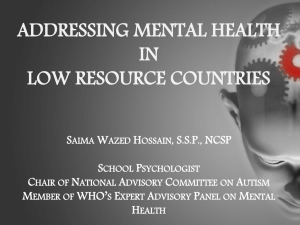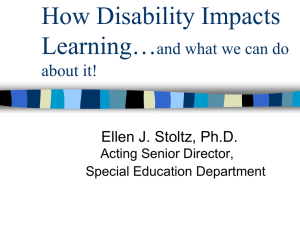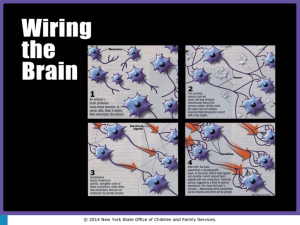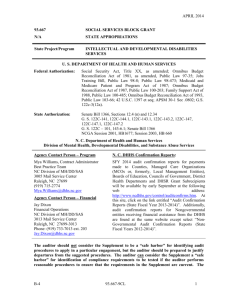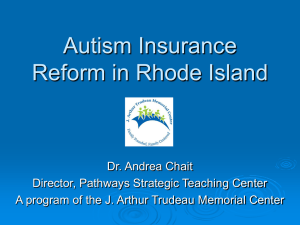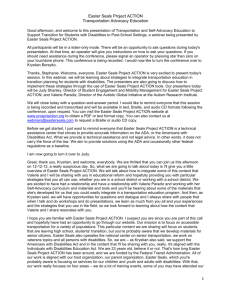Leadership Project
advertisement
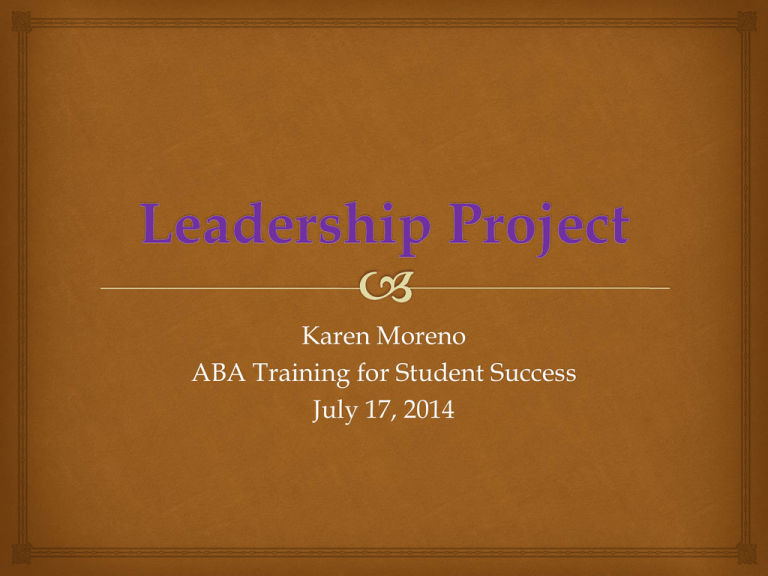
Karen Moreno ABA Training for Student Success July 17, 2014 Easter Seals of Southern California Easter Seals has been helping individuals with disabilities and special needs, and their families, live better lives for nearly 100 years. From child development centers to physical rehabilitation and job training for people with disabilities. Primary Easter Seals services include: Medical Rehabilitation Employment & Training Children's Services Adult & Senior Services Camping & Recreation Easter Seals of Southern California- Autism Department Easter Seals currently has a combination of services specifically targeting individuals with the diagnosis of ASD as well as other services that include individuals with ASD among their service recipients. Autism Department Serves: Young Children (0-Preschool) School Age Children and Youth Service for Adults MISSION Leadership Project My mission is to develop young individuals with disabilities to activate and develop creative minds, a sense of understanding and compassion for others, and create courage to act on their beliefs. ESSC Easter Seals Southern California provides innovative services for children and adults with disabilities and their families so they may actively participate in the community with the freedom to choose how they live, learn, work and play. CPSEL 4, 5 VISION Leadership Project My vision is to develop future adults with disabilities to use their spiritual, moral, intellectual, social, emotional, and physical characteristics in their personal and professional life with the support of their parental/guardian guidance. ESSC Children with disabilities will have access to the most appropriate educational and recreational opportunities. Adults with disabilities will have access to services that support their choices for independent living. Families of children and adults with disabilities will have access to services that support them in ensuring the well being of their families. Community members will have opportunities to interact with and learn about people with disabilities. CPSEL 1,4,5 Compelling Need Parent’s Understanding of Implementation Generalization of Concepts/Strategies Staff Effectiveness Staff Turn Around CPSEL 1,2,3,5 Inquiry Question How will ABA parent training on behavior management impact student ability to apply socially significant skills in their everyday life? CPSEL 4,5 PAR TEAM 8 Program Managers Karen Moreno, M.A. Ed. Amber Mark, M.A. Ed. Ajamu Frasier, M.S. Carly Polection, M.S. Crystal Bodell, M.S. Sabrina Ramirez, M.S. Olumide Edemodu, M.S., BCBA Terra Simms, M.S.S.W. Region Clinical Supervisor Paul Hunter, M.A., ED.S., BCBA Jenny Fineman, M.A., BCBA Region Training Representative Alysia Henderson Research Parent Training has been employed to alter negative parent-child interactions and reduce child behavior problems. (Dvortcsak, B. I., 2006). Been useful in reducing children’s observed aggressive and antisocial behaviors and increasing parental competence and positive parent-child relationships. (Dvortcsak, B. I., 2006). The behavioral treatment group also displayed fewer aberrant behaviors and social problems at follow-up. (McIntyre, L. L., 2008). Parent training has been shown to be a very effective method for promoting generalization and maintenance of skills in children with autism. (McIntyre, L. L., 2008). Barriers to the provision of parent training include the need for parent education models that can be easily implemented in ECSE programs and the need for preparation of special educators in parent education strategies. (Svein Eikeseth, T. S., 2008). Timeline October 2013-December 2013: Prep Time Meetings with Program Managers/Clinical Supervisor January 2014-June 2014: Implementation Staff Monthly Trainings Parent Training (home sessions) Program Managers/Clinical Supervisor Meetings CPSEL 1,2,3,4,5 Mixed Methodology Qualitative Data: • Observations Session- Staff and Parents • Monthly Trainings Staff • Emails/Calls • Program Managers/Clinical Supervisor Meetings • Surveys Staff, Program Managers, and Parents Quantitative Data: • Pre and Post Test During Staff Trainings • Compliance Training Frequency Duration • BI Attendance Percentage Qualitative Data Results Staff “I feel that the current ATM’s are good for giving out or reviewing information.” “They are a great chance for us to meet our coworkers who we usually don’t get a chance to see.” “It has helped me become more effective when implementing programs.” “I find the ATM’s very helpful!” “I like how we are able to hear other ideas, as well as how to manage behaviors.” Parents “Thank you! I would have never thought I would be comfortable enough to take my son to Disneyland.” “ABA services have been very helpful!” “I feel more comfortable implementing the techniques when I am alone with my daughter.” “I am so happy that my child is now potty trained!” Quantitative Data Results BI Attendance 100 100 90 70 60 50 40 Attendance 30 20 10 Average Percentage of Test Results 90 80 Percentage of Attendance Pre and Post Test Results 80 70 60 50 Pre- Test 40 Post Test 30 20 10 0 0 Months Months Quantitative Data Results Conclusion about Data Average Percentage of Completion of Phases North LA Region Parent Training 100 90 80 70 60 50 Compliance Phases 40 30 20 10 0 Phase 1 Phase 2 Phase 3 Phase 4 Compliance Phases Phase 5 Phase 6 Conclusion about Data BI Attendance Pre and Post Test Compliance Training- 6 Phases North LA Region- Parent Training Challenges Staff and Parents Consistency of Implementation Motivation to Implement outside of session (Generalization) Availability for Training Clinical Supervisor Support Availability Materials Change of Supervisor CPSEL 1,4,5 Next Steps Continue Staff and Parent Training Develop more curriculum based on need of staff and/or parent Consistency with training/implementation CPSEL 1, 2, 3,4,5 Leadership VS. Management Leadership Develop Curriculum Ran Staff Meetings Observations Parent Implementation Data Collection Management Calls Emails Surveys Meetings with Staff/Parents Observations in the home CPSEL 1,2,3,4,5 Personal Transformation Communication Leadership Team Work Patience Dedication Action References Dvortcsak, B. I. (2006). Including Parent Training in the Early Childhood Special Education Curriculum for Children With Autism Spectrum Disorders . Journal of Positive Behavior Interventions, 79-87. McIntyre, L. L. (2008). Parent Training for Young Children with Developmental Disabilities: Randomized Controlled Trial. NIHPA, 1-5. Svein Eikeseth, T. S. (2008). Outcome for Children with Autism who Began Intensive Behavioral Treatment Between Ages 4 and 7: A Comparison Controlled Study . U.S. National Library of Medicine, 23-27. The End




